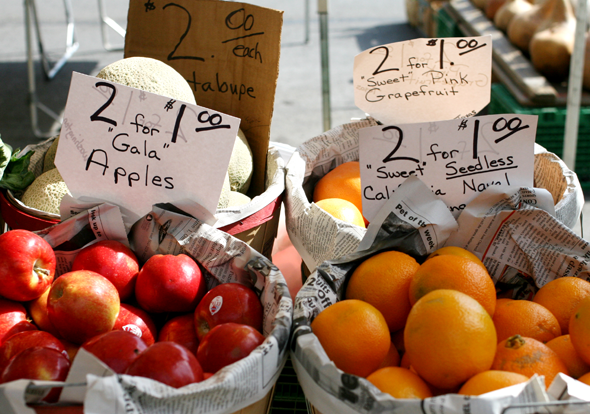Farmers encourage students to eat healthy and locally

April 21, 2009
Have you eaten your five fruits and vegetables today? As part of the month-long event of Earth Days in the Bluegrass, Tuesday is “Eat Something Local Day.â€
“Eat Something Local Day†is aimed to encourage students who are not able to participate in any of the other events that are going on, said Shane Tedder, the sustainability coordinator for UK’s Office of Residence Life.
Tedder also said that participants can e-mail a pledge to eat more local food and automatically become entered to win a free T-shirt. Earth Days in the Bluegrass is based around UK’s campus and is sponsored by Residence Life Sustainability and UK Greenthumb.
Fayette County has two local vegetable markets – the Lexington Farmers Market and the Bluegrass Farmers’ Market.
The Lexington Farmers Market is a co-op of 65 area farmers. It has three locations at different times throughout the week.
Right now people can find fresh garlic, onions, hydroponic tomatoes, mustard greens, turnip greens and kale at the market, said Roland McIntosh, who runs the Pawpaw Plantation and is a farmer for the Lexington Farmers Market.
“I would rather buy from local markets instead of a grocery store because at least you know what’s going on,†McIntosh said.
He said that vegetables found in the Farmers Market generally have been grown with fewer chemicals than more conventional produce, or none at all. Even though his produce is not certified organic, McIntosh said it is as close to organic as you can get without the certification because of the organic practices he uses.
The local markets may not always be able to compete with the prices of larger grocery stores in the area, but the flavor of produce in the Farmers Market is fresher, McIntosh said. People can get good deals in the Market if they make a bulk purchase, he said.
Joe McCord, another farmer from the Lexington Farmers Market, said in addition to fresh fruit and produce, he raises Tilapia fish, shrimp and quail. It is better to buy from the Farmers Market because you know where everything is from, he said.
The farmers at the Market get the waters used to raise their fish and shrimp tested annually, McCord said.
There are also health benefits involved with buying from farmers markets, McCord said. McCord uses very few chemicals and if he has to use some he uses the types that are not very strong, he said.
Both McIntosh and McCord gave tips on how to know if produce is fresh. When looking at the stump where the produce was cut off from the plant it is usually easy to tell if it is fresh, McCord said.
“If the area is green and crisp that usually means it’s fresh, and if it changed color and is drying up it probably isn’t that fresh,†he said.
Both farmers said they would have almost every type of produce that is possible to grow in Kentucky at the Farmers Market. McIntosh said he would have specialty melons, sassafras for tea and Kentucky Agate, which is the official state rock.
Tedder said buying local products has a good effect on the community because money stays in the immediate area. This keeps farmers farming, he said, which in turn keeps farmlands intact.
“Buying and eating local foods epitomizes the triple bottom line of sustainability, which simultaneously promotes economic vitality, ecological integrity and social justice,†Tedder said.
Both McIntosh and McCord encourage students to come to the Farmers Market to buy local produce. Not only do people gain health benefits from buying from the Market, but it is also a learning experience about the process and where food comes from, McIntosh said.
“It is a good part of education and a good healthy experience,†he said.






















































































































































